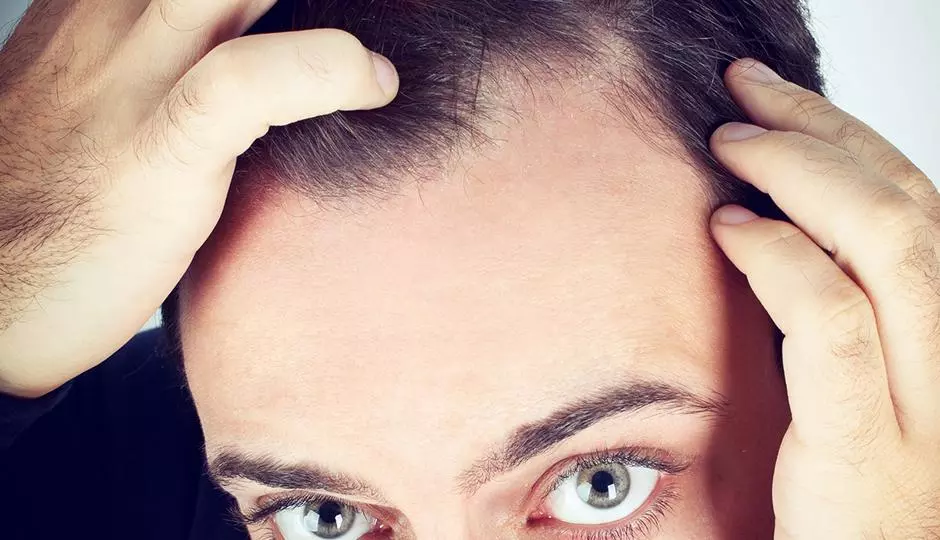You may be surprised to learn that human hair does not grow continuously. Each individual hair follicle goes through cycles of growth and rest. The resting period of the follicle is called the telogen phase.
The Human Hair Growth Cycle
Under normal healthy conditions, ongoing hair loss from follicles in the telogen phase isn't noticed because it is replaced by new hair growth from the follicles in the growth phase. When these balanced cycles are disrupted by hormonal changes, whether due to natural life cycles (pregnancy or menopause), stress, or disease, hair loss can occur.
Thyroid disease can be one of the disruptors to normal hair growth cycles because the thyroid gland plays such an important role in regulating the body's metabolism, setting the pace for how quickly cells function.
The Thyroid Gland
The thyroid gland is located in the neck just below the Adam's apple. The gland consists of two lobes on either side of the windpipe connected by a "bridge" known as the isthmus. The thyroid gland produces two hormones, thyroxine (T4) and triiodothyronine (T3). These hormones are secreted into the bloodstream and play a very important role in regulating the rate, or metabolism, of all cellular activity and tissues throughout the body. Cells convert T4 into T3, which in turn regulates how fast the cells work.
Hyperthyroidism and Hypothyroidism
When the thyroid gland secretes an excessive amount of the T3 or T4 hormones the disorder is called "hyperthyroidism". The high levels cause an accelerated metabolism, cells work faster, and the condition can lead to rapid heartbeat and accelerated bowel function, even diarrhea. Weight loss can occur even with no changes to the usual diet. Nervousness, irritability, and anxiety are other symptoms. With cells running in overdrive constantly, fatigue can also be a symptom.
As we might expect, when T3 levels are too low the opposite symptoms occur, with a sluggish heart rate and reduced bowel function leading to constipation. Weight gain is a common symptom. Anxiety and depression often occur, as the slow metabolic rate induces an overall feeling of sluggishness and lack of energy.
Both thyroid disorders can cause hair loss, but hypothyroidism is the more common of the two. Women are 50 times more likely than men to have hypothyroidism. Hair loss in these cases tends to be diffuse, that is spread over the entire scalp, thinning uniformly rather than in balding patches. Normal hair growth may resume after treatment of short-term thyroid problems, but it may be incomplete or vary in color or texture.
The Timing of Hair Loss From Thyroid Disease
Typically, thyroid disorders are diagnosed by your primary physician through blood work, and any subsequent hair loss may not be readily apparent at the time of diagnosis due to the long period of the human hair growth cycle. Hair loss may not be noticed until months later, occurring long after treatment for the thyroid condition has begun. While some thyroid medications can rarely cause hair loss, it's important not to blame the treatment itself for this delayed reaction. If treatment is stopped in error, hair loss can worsen, as well as other symptoms.
Alopecia Areata and Thyroid Disease
Alopecia areata is an autoimmune condition that causes hair loss and this condition may be associated with patients who have an autoimmune form of thyroid disease. In most cases this is transient and does not progress, but unfortunately it can cause significant baldness.
The Diagnostic Medical Approach to Hair Loss at HT&RC
We see patients quite frequently with thyroid disorders in their medical history, and while our practice does not treat the disorder itself, we can offer treatment options for any hair loss it may have caused. HT&RC brings a comprehensive set of solutions to address each hair loss problem by incorporating traditional surgical hair procedures, the latest non-surgical hair loss replacement techniques, medical therapies, and for those who can benefit from a non-surgical approach, Dr. Gray has partnered with Cesare Ragazzi. For more information about the hair loss solution which is right for you don't hesitate to contact us for a consultation.






